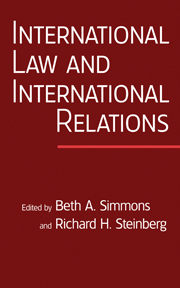Book contents
- Frontmatter
- Contents
- Contributors
- Abstracts
- Preface
- Editors' Note
- PART I INTERNATIONAL REGIMES THEORY: DOES LAW MATTER?
- PART II COMMITMENT AND COMPLIANCE
- PART III LEGALIZATION AND ITS LIMITS
- 6 The Concept of Legalization (2000)
- 7 Legalized Dispute Resolution: Interstate and Transnational (2000)
- 8 Legalization, Trade Liberalization, and Domestic Politics: A Cautionary Note (2000)
- 9 Alternatives to “Legalization”: Richer Views of Law and Politics (2001)
- PART IV INTERNATIONAL LAW AND INTERNATIONAL NORMS
- PART V TREATY DESIGN AND DYNAMICS
- PART VI LAW AND LEGAL INSTITUTIONS
- PART VII OTHER SUBSTANTIVE AREAS OF INTERNATIONAL LAW
- References
- Index
6 - The Concept of Legalization (2000)
Published online by Cambridge University Press: 05 June 2012
- Frontmatter
- Contents
- Contributors
- Abstracts
- Preface
- Editors' Note
- PART I INTERNATIONAL REGIMES THEORY: DOES LAW MATTER?
- PART II COMMITMENT AND COMPLIANCE
- PART III LEGALIZATION AND ITS LIMITS
- 6 The Concept of Legalization (2000)
- 7 Legalized Dispute Resolution: Interstate and Transnational (2000)
- 8 Legalization, Trade Liberalization, and Domestic Politics: A Cautionary Note (2000)
- 9 Alternatives to “Legalization”: Richer Views of Law and Politics (2001)
- PART IV INTERNATIONAL LAW AND INTERNATIONAL NORMS
- PART V TREATY DESIGN AND DYNAMICS
- PART VI LAW AND LEGAL INSTITUTIONS
- PART VII OTHER SUBSTANTIVE AREAS OF INTERNATIONAL LAW
- References
- Index
Summary
“Legalization” refers to a particular set of characteristics that institutions may (or may not) possess. These characteristics are defined along three dimensions: obligation, precision, and delegation. Obligation means that states or other actors are bound by a rule or commitment or by a set of rules or commitments. Specifically, it means that they are legally bound by a rule or commitment in the sense that their behavior thereunder is subject to scrutiny under the general rules, procedures, and discourse of international law, and often of domestic law as well. Precision means that rules unambiguously define the conduct they require, authorize, or proscribe. Delegation means that third parties have been granted authority to implement, interpret, and apply the rules; to resolve disputes; and (possibly) to make further rules.
Each of these dimensions is a matter of degree and gradation, not a rigid dichotomy, and each can vary independently. Consequently, the concept of legalization encompasses a multidimensional continuum, ranging from the “ideal type” of legalization, where all three properties are maximized; to “hard” legalization, where all three (or at least obligation and delegation) are high; through multiple forms of partial or “soft” legalization involving different combinations of attributes; and finally to the complete absence of legalization, another ideal type. None of these dimensions – far less the full spectrum of legalization – can be fully operationalized.
- Type
- Chapter
- Information
- International Law and International RelationsAn International Organization Reader, pp. 115 - 130Publisher: Cambridge University PressPrint publication year: 2007

